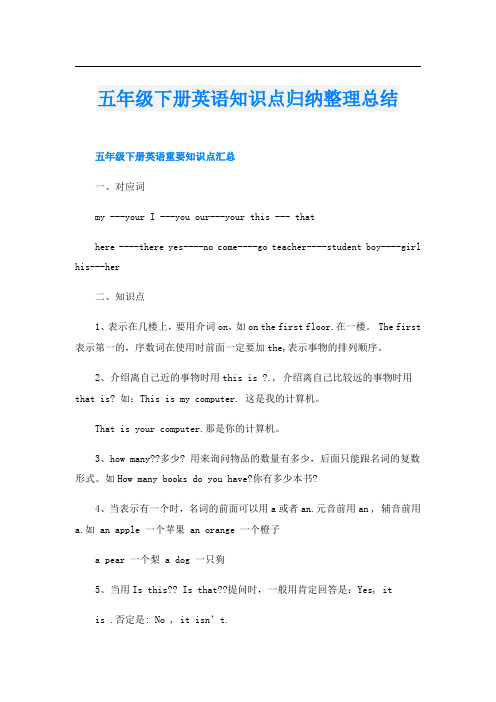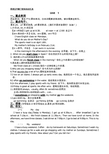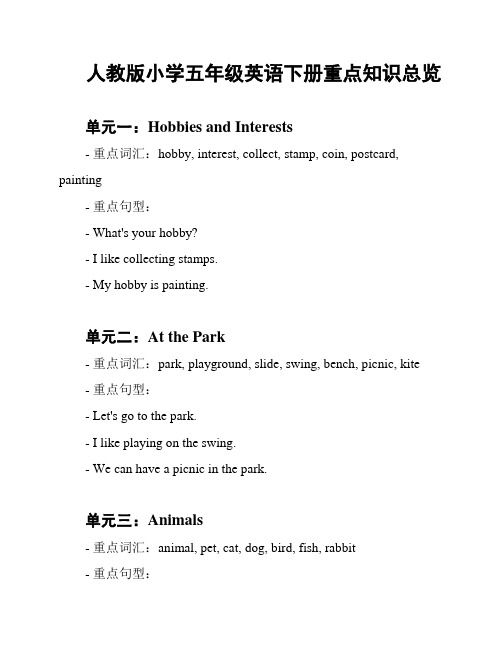新版五年级英语下册知识点总结最全
五年级下册英语知识点归纳整理总结

五年级下册英语知识点归纳整理总结五年级下册英语重要知识点汇总一、对应词my ---your I ---you our---your this --- thathere ----there yes----no come----go teacher----student boy----girl his---her二、知识点1、表示在几楼上,要用介词on,如on the first floor.在一楼。
The first 表示第一的,序数词在使用时前面一定要加the,表示事物的排列顺序。
2、介绍离自己近的事物时用this is ?., 介绍离自己比较远的事物时用that is? 如:This is my computer. 这是我的计算机。
That is your computer.那是你的计算机。
3、how many??多少? 用来询问物品的数量有多少,后面只能跟名词的复数形式。
如How many books do you have?你有多少本书?4、当表示有一个时,名词的前面可以用a或者an.元音前用an , 辅音前用a.如 an apple 一个苹果 an orange 一个橙子a pear 一个梨 a dog 一只狗5、当用Is this?? Is that??提问时,一般用肯定回答是:Yes, itis .否定是: No , it isn’t.三、句子:1、This is the teacher’s office.这是老师办公室。
2、That is my classroom.那是我的教室。
3、Go to the library. Read a story-book..去图书馆。
读故事书。
4、Is this the library? Yes, it is.这是图书馆吗?是的。
5Is that the art room? The art room is on the second floor.那是美术室吗?不是,美术室在二楼。
一年级起点新版外研社小学英语五年级下册知识点汇总

一年级起点新版外研社小学英语五年级下册知识点汇总n:Module 1Vocabulary:1.Drive (past tense: drove) - to operate a vehicle2.Flute - a musical instrument3.Player - a person who performs on a musical instrument4.Office - a place of work5.Factory (plural: factories) - a place where goods are manufactured6.Shop - a place where goods are sold7.Hospital - a place where sick or injured people are treated8.Fish - to catch or go fishing (verb)9.Farm - a place where crops or animals are raisedExpanded job titles:1.Farmer - a person who works on a farm2.Postman - a person who delivers mail3.Doctor - a medical nal4.Nurse - a medical nal who provides care to patients5.Firefighter / Fireman - a person who fights fires6.Writer - a person who writes books。
articles。
or other texts7.Driver - a person who operates a vehicle8.Policeman - a law enforcement officerPhrases:1.In the picture - in the photograph2.Drive a bus - operate a bus3.Chinese music - music from China4.Play the flute - perform on a flute5.Teach English - instruct in the English language6.Work in an office - work at a place of business7.Work in a factory - work at a manufacturing facility8.Work in a shop - work at a retail establishment9.Work in a hospital - work at a medical facility10.Work on a farm - work at a place where crops or animals are raised11.A flute / erhu player - a person who performs on a flute or erhu12.Work at a school - work at an nal n13.Work at a bank - work at a financial nGrammar points:In this module。
小学五年级英语下册知识点归纳总结

千里之行,始于足下。
小学五年级英语下册知识点归纳总结下面归纳了小学五年级英语下册的主要知识点:
1. 时态:学习了现在进行时、一般现在时和一般过去时的用法。
2. 句型:学习了不同句型的构成,例如陈述句、疑问句、否定句等。
3. 单词:词汇量增加,学习了更多的高频词汇,如动物名称、家庭成员、食物和运动等。
4. 语法:学习了基本的语法规则,如名词的单数和复数形式、形容词的比较级和最高级、副词的用法等。
5. 对话:学习了如何进行简单的对话,包括自我介绍、问候和交流等。
6. 阅读理解:学习了阅读并理解简单的文章和故事,并回答相关问题。
7. 写作:学习了如何写简单的句子和短文,以及如何描述人物和事件。
8. 听力:通过听力练习,培养对听力材料的理解和表达能力。
9. 课文:学习了课本中的相关课文内容,包括短文、对话和歌曲等。
这些都是小学五年级英语下册的主要知识点,学生需要通过课堂学习和课后复习来掌握和巩固这些知识。
第1页/共1页。
英语五年级下册知识点汇总

四会单词:课本P72黑体单词,白体词需要读准读熟,部分需要会默写。
二、重点句子:课本p4, p7要求背诵,p9要求熟读。
(请打开课本背诵吧!加油!)1.介词at, on, in的区别【at +时刻】I get up at 6:30. at noon = at 12:00 在正午【on+具体的一天】比如,on+星期,on+节日I have English class on Mondays.What do you do on Mother’s Day?The sports meet is on April 16th.My mother’s birthday is on February 21st.【in +季节,月份】I can swim in summer.in the morning/in the afternoon/in the evening 在早晨、在下午、在晚上2. When do you start class in Spain?你在西班牙什么时候开始上课?3. 询问某人什么时间做某事的句型When do you finish class in the morning?你们上午的课什么时候结束?4.表达某人某时间做某事的句型We finish class at 1 o’clock我们一点钟结束上午的课.5.Why are you shopping today? 你今天为什么购物?6.That sounds like a lot of fun.那听起来很有趣。
7.I live on an island. I always get up early every day. 我居住在一个岛上,我总是每天起很早。
8.I often go swimming in the water. 我经常在水里游泳。
9.In the afternoon, I play sports with my friend. 在下午,我和朋友进行体育运动。
(完整版)人教版五年级英语下册Unit1知识点汇总

Unit1 My day 知识整理△话题:谈论每天的活动及时间安排△词汇:do morning exercises(做早操)eat breakfast/lunch/dinner(吃早餐/午餐/晚餐)have...class(上…课),play sports(做运动)clean my room(打扫我的房间),go for a walk (散步) go shopping(购物),take a dancing class(上舞蹈课)△拓展词汇:get up(起床), go to bed(上床睡觉)wash my clothes(洗我的衣服), watch TV(看电视)do homework(做作业), play music(演奏音乐)cook dinner(煮晚餐), at home(在家)in the morning(在上午),in the afternoon(在下午)in the evening(在晚上),at night(在半夜)△句型:①询问做某事在几点When do you+动词原形(短语)+其他?—— At +时间—— I(+频度副词)+动词原形(短语)+at+时间。
例句:When do you get up in the morning?—— At 7:30.—— I often get up at 7:30.②询问周末的活动安排What do you often do on the weekend?I often (always/sometime/usually) +…(周末的活动)+with … (某人)+on the weekend (on Saturdays/on Sundays ).例句:What do you do on the weekend ?I often take a dancing class with my friend on Sundays. △知识点:1:注意介词的搭配at +具体时间(几点)/night/home at 9 o ’clock in +国家/季节 in Spainon +星期 on the weekend/on Sundays with +人 with my father/mother/friend 2:表示时间频率词的区别always 表示总是,一直;usually 表示经常,通常;often 表示经常,常常;sometimes 表示有时,间或。
人教版小学五年级英语下册重点知识总览

人教版小学五年级英语下册重点知识总览单元一:Hobbies and Interests- 重点词汇:hobby, interest, collect, stamp, coin, postcard, painting- 重点句型:- What's your hobby?- I like collecting stamps.- My hobby is painting.单元二:At the Park- 重点词汇:park, playground, slide, swing, bench, picnic, kite- 重点句型:- Let's go to the park.- I like playing on the swing.- We can have a picnic in the park.单元三:Animals- 重点词汇:animal, pet, cat, dog, bird, fish, rabbit- 重点句型:- Do you have any pets?- I have a pet cat.- The bird is singing.单元四:Food and Drinks- 重点词汇:food, drink, apple, banana, orange, milk, water- 重点句型:- What's your favorite food?- I like eating apples.- Can I have some water?单元五:Weather and Seasons- 重点词汇:weather, sunny, cloudy, rainy, snowy, spring, summer, autumn, winter- 重点句型:- What's the weather like today?- It's sunny and warm.- I like playing in the snow.单元六:My Family- 重点词汇:family, father, mother, brother, sister, grandfather, grandmother- 重点句型:- How many people are there in your family?- I have one brother and one sister.- My grandparents live with us.单元七:School Life- 重点词汇:school, classroom, teacher, student, desk, chair, book, pen- 重点句型:- What's your favorite subject?- I like English.- We study at school.单元八:Sports and Activities- 重点词汇:sports, activity, football, basketball, volleyball, swimming, dancing- 重点句型:- Do you like sports?- Yes, I like playing football.- Let's go swimming together.单元九:Transportation- 重点词汇:transportation, car, bus, bicycle, taxi, train, subway - 重点句型:- How do you go to school?- I go to school by bus.- I want to take a train.单元十:Occupations- 重点词汇:occupation, doctor, teacher, nurse, firefighter, policeman, musician- 重点句型:- What do you want to be in the future?- I want to be a doctor.- My mom is a teacher.以上是人教版小学五年级英语下册的重点知识总览,希望对你有帮助!。
新精通版五年级下册小学英语全册单元知识点小结
Unit Welcome to our school!一、核心词汇1.名词music音乐way路;道路library图书馆2.代词we我们our我们的3.动词meet相遇;开会welcome欢迎have有like喜欢4.其他all所有;全部many许多also也;同样very much非常please请二、拓展词汇1.动词borrow(向某人、从某人)借2.短语science lesson科学课English lesson英语课meeting room会议室science lab科学实验室language lab语言实验室art club美术(艺术)俱乐部music club音乐俱乐部borrow books借书have a meeting开会paint a picture(用颜料)绘画play the piano弹钢琴三、核心句型1. Welcome to our school! 欢迎来到我们学校!解读:这是一个迎接宾客的礼貌用语,是一个祈使句,其后跟地点名词。
举一反三: Welcome to our city! 欢迎来到我们城市!Welcome to China! 欢迎来到中国!2. We often borrow books from the library. 我们经常从图书馆里借书。
解读:这是一个描述某人经常做某事的句型。
举一反三: They often borrow some English books from Beijing Library. 他们经常从北京图书馆里借一些英语书。
3. —How many English lessons do you have in a week? 你们一周有多少节英语课?—We have three. 我们有三节。
解读:这是用来询问对方有多少节课的句型。
举一反三: —How many PE lessons do you have in a week? 你们一周有多少节体育课?—We have five. 我们有五节。
新人教版PEP 【小学五年级英语下册】 单元知识点 归纳总结
新人教版PEP 【小学五年级英语下册】单元知识点归纳总结Unit 1 My DayIn this unit。
we learn some core vocabulary words。
phrases。
and XXX.Core Vocabulary:1.Verbs: take (studying)。
go to (class)2.Nouns: dancing。
exercise。
sports3.Phrases: do morning exercises。
eat breakfast。
play sports。
eat dinner。
go for a walk。
go shopping。
clean my room。
take a dancing class。
have a classXXX Vocabulary:1.Verbs: start。
shop。
work。
need。
live。
win。
sound2.Nouns: Spain。
play。
letter。
island。
cave3.ns: after4.XXX: when。
XXX。
a.m。
p.m。
why。
last。
also。
busy5.nal Vocabulary: frequency adverbs (always。
usually。
sometimes)Phrases:watch TV。
eat lunch。
go to bed。
go swimming。
go home。
go to schoolCore Sentence Structure:When do you do morning exercises?" "At 7 o'clock."XXX phrase is "good job" to praise XXX.Which season do you like best。
I like winter best。
This sentence means "which one do you like the most" and "like。
人教版小学五年级英语下册重点知识归类
人教版小学五年级英语下册重点知识归类本文档旨在归类整理人教版小学五年级英语下册的重点知识,以帮助学生更好地研究和复。
单元一:We're going to have a picnic.本单元主要介绍组织和准备野餐的相关内容。
重点知识:- 词汇:picnic, sandwiches, fruit, watermelon, drinks- 语法:be going to + 动词原形,如 "We're going to eat sandwiches."- 句型:What are you going to do at the picnic?单元二:When is Easter?本单元研究了一些节日和时间的表达方式。
重点知识:- 词汇:Easter, Christmas, New Year's Day, Halloween- 语法:疑问词when和具体时间的表达,如 "When is Easter?"- 句型:When is Christmas?单元三:Do you want to go to a movie?本单元研究了表达意愿和邀请的相关内容。
重点知识:- 词汇:movie, park, zoo, museum, swimming pool- 语法:do you want to + 动词原形,如 "Do you want to go to a movie?"- 句型:Do you want to go to the park?单元四:Can you swim?本单元介绍了一些体育运动和能力的表达方式。
重点知识:- 词汇:swim, run, jump, skate, ride- 语法:can + 动词原形,如 "Can you swim?"- 句型:Can you ride a bike?单元五:What's the matter with you?本单元主要研究了描述身体状况和感受的表达方式。
新版PEP五年级英语下册各单元的知识点
新版PEP五年级英语下册各单元知识点一. 重点词汇。
1. 四会:eat breakfast吃早饭 have···class 上······课 play sports 进行体育运动exercise 活动;运动 do morning exercises做早操 eat dinner吃晚饭clean my room 打扫我的房间 go for a walk 散步 go shopping 去买东西;购物take学习;上(课) dancing 跳舞;舞蹈 take a dancing class 上舞蹈课2. 三会:when什么时候 after在(时间)后 start开始 usually通常地;惯常地 Spain西班牙late晚;迟 a.m.午前;上午 p.m.午后;下午 shop去买东西;购物 why为什么work工作 sound听起来好像 also还;也 last上一个的;刚过去的 busy忙的need需要 play戏剧;剧本 letter信 live居住 island 岛win获胜 always总是;一直 cave山洞;洞穴 go swimming去游泳二. 其他日常活动。
get up起床 eat lunch吃午饭 go to bed 上床睡觉wash my face洗脸 wash my clothes 洗我的衣服 watch TV看电视play ping-pong打乒乓球 play the pipa弹琵琶 go swimming 去游泳go running去跑步 do homework 做作业 do kung fu练武术play football踢足球 play basketball打篮球三. 频度副词。
always总是,一直(100%)usually通常(80%) often 经常(60%)sometimes有时(30%)四. 重点句型。
- 1、下载文档前请自行甄别文档内容的完整性,平台不提供额外的编辑、内容补充、找答案等附加服务。
- 2、"仅部分预览"的文档,不可在线预览部分如存在完整性等问题,可反馈申请退款(可完整预览的文档不适用该条件!)。
- 3、如文档侵犯您的权益,请联系客服反馈,我们会尽快为您处理(人工客服工作时间:9:00-18:30)。
新版PEP五年级英语下册期末复习资料一、重点词汇。
eat breakfast吃早餐 play sports 进行体育运动have···class 上···课 have an English class 上英语课 have a maths class 上数学课exercise 活动,运动 do morning exercises早锻炼 eat dinner吃晚饭clean my room 打扫我的房间 go for a walk 散步 go shopping 去购物take学习,上(课) dancing 舞蹈 take a dancing class 上舞蹈课上午 .下午 usually 通常地二、其他日常活动。
eat breakfast 吃早饭 eat lunch吃午饭 eat dinner 吃晚饭get up起床 go to bed 上床睡觉 wash my clothes 洗我的衣服watch TV看电视 go swimming 去游泳 go running去跑步do homework 做作业 do kungfu练武术 play ping-pong打乒乓球play football踢足球 play basketball打篮球 play the pipa弹琵琶play music 演奏音乐 finish class 结束上课 start class 开始上课in the water/sea 在水里/在海里 is good at 擅长 get off 逃脱 lots of 许多三、频度副词。
always总是,一直(100%) usually通常(80%) often 经常(60%) sometimes(30%)有时四、疑问词。
when什么时候 why 为什么 what 什么五、重点句型。
1、询问别人什么时候做某事的句型及回答。
句型结构:问:When do you+动词短语原形+其他(你/你们什么时候做某事)答:I/we(+频度副词)+动词短语原形+at+具体时间(我/我们通常在几点做某事。
)例:问:When do you go to bed(你什么时候上床睡觉)答:I go to bed at 9:(我晚上9点上床睡觉。
)注意:当主语是第三人称单数(he,she,it,单个人名或单数名词)时,助动词do要变成does,句型结构是:when does+主语(第三人称单数)+动词短语原形+其他2、询问别人周末做什么的句型及回答。
句型结构:问:What do you do on the weekend(你周末做什么)答:I(+频度副词)+动词(短语)+其他。
例:问:What do you do on the weekend(你周末做什么)答:I often watch TV and play ping-pong with my father.(我经常看电视,也常和我爸爸一起打乒乓球。
)注意:当主语是第三人称单数(he,she,it,单个人名或单数名词)时,助动词do要变成does,句型结构是:what does+主语(第三人称单数)+do+on the weekendare you shopping today 为什么今天是你在购物--My mum worked last night. 我妈妈昨晚工作了。
sounds like a lot of fun. 那听起来好像很有趣。
need a robot to help you. 你需要一个机器人来帮你。
一、重点词汇spring 春天 summer 夏天 autumn秋天 winter 冬天 season季节picnic 野餐 go on a picnic 去野餐 pick摘 pick apples摘苹果snowman雪人 make a snowman 堆雪人 best最 go swimming去游泳which 哪一个 because 因为 vacation 假期 leaf 叶子(复数) leaves二、其他1、形容天气的形容词 hot 炎热的 warm 暖和的 rainy多雨的 windy 多风的 foggy有雾的cold 寒冷的 cool凉爽的 sunny晴朗的 cloudy 多云的 snowy下雪的2、由go构成的活动短语 go swimming去游泳 go shopping去购物 go boating去划船go skating去滑冰 go hiking去远足 go fishing去钓鱼三、重点句型1、询问别人天气怎么样的句型及回答。
句型结构:问:What’s the weather like+时间+地点(···天气怎么样)答:It’s+表示天气的形容词例:问:What’s the weather like in winter in beijing(北京冬天的天气怎么样)答:It’s cold and windy(有风而且寒冷。
)2、询问别人最喜欢的季节句型及回答。
句型结构:问:which season do you like best (你最喜欢的季节是哪一个)答:I like+季节+best或直接说季节名称。
例:I like spring best./ spring.同义句还有:What’s your favourite season3、询问别人喜欢某个季节的原因的句型及回答。
句型结构:问:Why do you like+季节名称或直接用“Why”来提问。
答:一般要用“because”引导的句子来说明理由,可以从天气相关的活动等方面来说。
例:问:Why do you like spring(你为什么喜欢春天)答:Because there are beautiful flowers everywhere .(因为到处都有美丽的花。
)问:Why do you like summer(你为什么喜欢夏天)答:Because I can go swimming everyday.(因为我每天都能去游泳。
)问:Why do you like autumn(你为什么喜欢秋天)答:Because the weather is cool.(因为天气凉爽。
)问:Why do you like winter(你为什么喜欢冬天)答:Because I can make a snowman.(因为我能堆雪人。
)一、重点词汇January一月 February二月 March三月 April四月 May五月 June六月July七月 August 八月 September 九月 October十月 November 十一月 December十二月注意:1、月份的首字母一定要大写。
2、May没有缩写形式,September的缩写形式是“Sept.”,其他月份单词的缩写形式都是由单词的前三个字母加“·”构成。
3、月份的缩写形式不用在句子中,只能单独使用。
4、表示“在几月”时,要在月份单词前面加介词in。
二、常用节假日名称。
New Year’s Day元旦() Tree Planting Day 植树节() Easter 复活节(4月)April Fool’s Day愚人节() May Day 劳动节()Mother’s Day母亲节(五月的第二个星期天)Children’s Day 儿童节()Father’s Day父亲节(六月的第三个星期天)Teacher’s Day教师节() National Day国庆节()Mid-Autumn Day 中秋节(农历八月十五) Thanksgiving Day 感恩节(11月第4个周四)Christmas圣诞节() summer vacation暑假 winter vacation寒假三、活动名称sports meet 运动会 Easter party 复活节聚会 school trip 学校旅行Chinese test 语文测试 maths test 数学测试 singing contest歌咏比赛birthday party生日聚会四、短语cook 做饭 make a card 制作卡片 sing to her给她唱歌say “Thank you”说谢谢您write her a letter 给她写封信 tell her a story给她将故事 play the pipa for her 为她弹琵琶look for 寻找 make zongzi 包粽子 eat mooncakes 吃月饼 eat noodles 吃面条make a wish 许愿 eat a birthday cake 吃生日蛋糕 play games 玩游戏五、介词in 、on、 at的用法。
1、in后面+上午/下午/晚上/月份/季节/年份。
如:in the morning, in the afternoon, in the eveningin April, in winter, in 2015.2、on的后面+具体的某一天。
如:on Monday, on April 3rd, on Friday morning,on the weekend.3、at后面+具体的时间点或与其他词构成固定搭配。
如:at six o’clock, at 12:30, at noon,at night六、重点句型。
1、问答某个活动或节日在几月份的句型及回答。
句型结构:问:When is+活动或节日名称答:It’s in+月份。
例:问:when is Christmas(圣诞节在什么时候)答:It’s in December.(在十二月。
)2、询问别人将要做什么的句型及回答。
句型结构:问:What will you do+其他答:I will····=I’ll···例:问:what will you do for your mum on Mother’s Day(母亲节你将为你妈妈做什么)答:I’ll cook for my mother. What about you(我将会为妈妈做饭,你呢)3、表达“我们将要···”的句型。
We’ll···=We will 后面+动词原形,这是一个一般将来时的句子,表示将来某个时间要发生的动作或事情。
例:We’ll have a school trip.(我们将有一次学校旅行。
)We’ll have a singing contest.(我们将有一次歌咏比赛。
